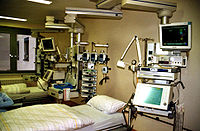
Photo from wikipedia
Abstract Coronavirus disease 2019 (COVID-19) becomes a global pandemic in 2020. Early identification of severe ill patients is a top priority for clinicians. We aimed to describe clinical features and… Click to show full abstract
Abstract Coronavirus disease 2019 (COVID-19) becomes a global pandemic in 2020. Early identification of severe ill patients is a top priority for clinicians. We aimed to describe clinical features and risk factors of severe-critically ill patients with COVID-19 in Jiangsu Province. This multi-centered retrospective study collected the information of 631 laboratory-confirmed COVID-19 patients hospitalized at 28 authorized hospitals in Jiangsu province from January 23, 2019 to March 13, 2020. A total of 583 adult patients with laboratory-confirmed COVID-19 were enrolled for final analysis, including 84 severe-critically ill patients and 499 mild-moderate patients. Median age of the severe-critically ill patients was 57.0 years old (interquartile range, 49.0–65.8), and 50 (59.5%) were males. Multisystemic laboratory abnormalities were observed on admission for severe-critically ill patients. These patients showed more noticeable radiologic abnormalities and more coexisting health issues as compared to the mild-moderate patients. Most of the severe-critically ill COVID-19 patients became deteriorated in 2 weeks after diagnosis. Age, D-dimer, and lymphocytes were independently associated with the progression of severe-critically illness. Older age, higher D-dimer levels and less lymphocyte counts on admission are potential risk factors for COVID-19 patients to develop into severe and critically illness.
Journal Title: Medicine
Year Published: 2021
Link to full text (if available)
Share on Social Media: Sign Up to like & get
recommendations!